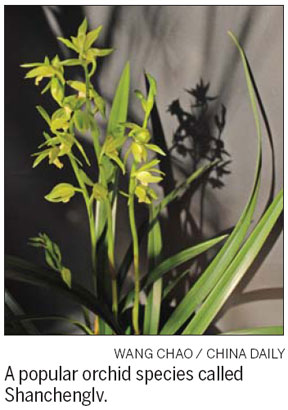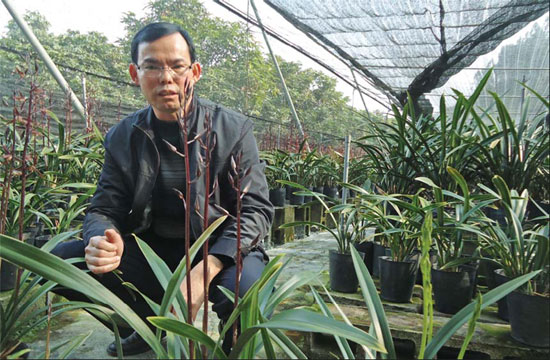A classy gentleman, and a money spinner
Updated: 2013-02-22 07:16
By Wang Chao (China Daily)
|
||||||||
|
Zhang Enci in his orchid garden at Zhangzhou, Fujian province. Wang Chao / China Daily |
Gone are the days when you could sell an orchid and buy a Mercedes, but the revered flower still pulling in dollars
Whoever decided to give the name narcissus to a flower that many of us call a daffodil obviously did not have a marketing degree.
The orchid, on the other hand, does not carry the baggage of an association with a personality disorder. Indeed in China the orchid enjoys a revered place with bamboo, the chrysanthemum and the plum blossom as one of The Four Gentlemen of its art.
Not only that, but the orchid is said to represent the qualities of quietness, friendship, integrity and an indifference to fame.
On top of that, the flower is regarded as particularly delicate and susceptible to early death, and anyone with an orchid or two on show at home is considered not only to have good taste, but also to be endowed with traits of patience and longsuffering.
All of that means that when the flower industry of Zhangzhou markets its orchids, it has a huge head start, and the city is reaping the financial rewards of that.
Thanks to the ingrained orchid culture, Chinese orchids have a multitude of admirers and willing buyers worldwide, particular Chinese living in Europe and the United States.
Zhang Enci, secretary-general of Zhangzhou Orchid Association, says most of its overseas sales emanate from orchid trading websites. Orchid aficionados place orders on the sites, and take delivery by express mail.
Helping to sate this floral fascination are 213 hectares of orchid plantations in Zhangzhou, cultivating more than 1,000 species of orchid, yielding 60 million pots every year, the local government says. About 5 percent of the annual output of 1 billion yuan is generated by exports, major destinations including Japan, South Korea, Europe and the US.
Orchid cultivation in Zhangzhou dates back to the Ming Dynasty (1368-1644), when orchids were mostly indigenous flowers growing in the mountains. In the wild, the leaves were slimmer and blossoms were smaller, but after centuries of human selection and growing they became more colorful and bright.
Liu Jianyun owns three Chinese orchid gardens in the city, covering 3.5 hectares. He says he grows more than 200,000 pots of orchids, valued at about 7 million yuan ($1.1 million; 840,000 euros), a year. Every year he sells 60 percent and saves the rest for seedlings.
It takes an orchid plant two years to mature, and the average price for a pot is 40 yuan. But Liu says that even experts such as him have to make provision for a loss of 15 percent of the plants as many of them fail to make it to maturity.
Liu's plantation is among 62 large orchid plantations in Zhangzhou, anything larger than 1.5 hectares regarded as fitting in that category. There are also 25 joint-venture gardens and 1,700 self-employed businesses. The industry is said to employ 12,000 people.

Many of the gardens have been passed down from generation to generation, and a common talking point for the owners is what is regarded as a golden age for the industry nine years ago.
That year a single pot of a particular species fetched 10 million yuan ($1.6 million; 1.2 million euros) and as buying a Chinese orchid became akin to buying an expensive car they were dubbed Benchi lanhua (the Mercedez-Benz orchid).
But those days seem to be over, because precious species are easily reproduced by tissue cultures today, and the most expensive species costs less than 10,000 yuan.
"As cultivation technology matured, the price of orchids returned to normal," Zhang says.
"Making an instant fortune selling these flowers has become hard to do, and we have to focus on quality and marketing."
Although the city is one of the country's biggest orchid producers, Zhang says, exports are small, partly because of a lack of logistics for fresh flowers.
At the risk of dehydration and death en route, the delicate flower demands transport to overseas destinations by air.
"But air freight is outrageously expensive in China," Zhang says. "That helps explain why overseas buyers are still largely limited to hard-bitten orchid lovers rather than everyday households."
So in addition to Chinese communities in Japan, the US and Europe, Zhangzhou sells its orchids to nearby provinces. As the flower blossoms for 20 days during winter, it is seen as a harbinger of spring, and the great bulk of sales take place during Spring Festival.
One species that is particularly popular at the moment is the butterfly orchid, which is widespread in Southeast Asia, North America and North Africa. These orchids, colorful and bright, are particularly popular in Europe and the US, while Chinese orchids, simple and elegant, seem to appeal more to Asian tastes.
Hong Gerui, manager of Zhangzhou Jetting Biotechnology Co, says exports to Western countries have grown rapidly in recent years. The company is one of China's top five orchid producers and has customers worldwide.
Hong says European clients customers buy about 50,000 young plants from the company a month, as do Japanese customers. Each plant sells for 5 or 6 yuan.
"Zhangzhou's climate is optimal for butterfly orchids, and as we have been growing this variety for more than 10 years, we have experience and skills our European counterparts don't have."
The plants produced here are much cheaper than those cultivated in Europe, he says.
But Zhang of the orchid association says market potential has not been fully exploited.
"The industry chain is not complete. Most farmers just grow flowers and pay little attention to marketing."
Buyers now have to go to plantations scattered around the city comparing quality and prices, which is highly inconvenient.
Zhang says Zhangzhou urgently needs an orchid center where farmers can exhibit and sell their flowers and customers have a one-stop shop.
"In the Netherlands there are many flower centers like that, where major plantations from around the world display their products and do deals. This needs to be the top priority for Zhangzhou's orchid industry."
wangchao@chinadaily.com.cn
(China Daily 02/22/2013 page15)

 Li Na on Time cover, makes influential 100 list
Li Na on Time cover, makes influential 100 list
 FBI releases photos of 2 Boston bombings suspects
FBI releases photos of 2 Boston bombings suspects
 World's wackiest hairstyles
World's wackiest hairstyles
 Sandstorms strike Northwest China
Sandstorms strike Northwest China
 Never-seen photos of Madonna on display
Never-seen photos of Madonna on display
 H7N9 outbreak linked to waterfowl migration
H7N9 outbreak linked to waterfowl migration
 Dozens feared dead in Texas plant blast
Dozens feared dead in Texas plant blast
 Venezuelan court rules out manual votes counting
Venezuelan court rules out manual votes counting
Most Viewed
Editor's Picks

|

|

|

|

|

|
Today's Top News
Boston bombing suspect reported cornered on boat
7.0-magnitude quake hits Sichuan
Cross-talk artist helps to spread the word
'Green' awareness levels drop in Beijing
Palace Museum spruces up
First couple on Time's list of most influential
H7N9 flu transmission studied
Trading channels 'need to broaden'
US Weekly

|

|








